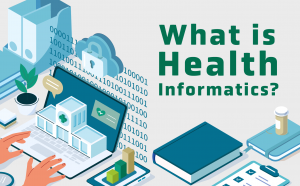Launching a new career after serving in the military can be a challenge. Veterans with a passion for healthcare and a talent for computers, however, will find a high-demand industry awaits when they are ready to make the transition to the civilian workforce. Health informatics degrees can open the door to post-military careers that are loaded with potential.
What is Health Informatics?
Health informatics is a career that combines medicine, computer science and information science. Professionals in this field work to integrate clinical and information processes to improve health care, support research, enhance patient care and increase collaboration among providers and researchers.
With federal mandates now requiring healthcare providers to establish and maintain electronic health records, the demand for health informatics professionals is skyrocketing. The U.S. Bureau of Labor Statistics (BLS) anticipates a growth rate in the eHealth field of 32% through 2029 as insurers, hospitals, pharmaceutical companies and others in the health care industry strive to keep up with new regulations for Medicare and Medicaid funding.
Though health informatics is firmly rooted in information technology, the field demands an understanding of the medical profession, as well. The combination of these two distinct interest areas helps ensure that process and program configurations are more intuitive to the medical profession and that proper care protocols and confidentiality issues are not overlooked.
Veterans Making the Transition
Leveraging GI Bill® funding to pursue degrees in health informatics is becoming a popular choice for veterans.
Matt Walker, a former Navy nurse, fell into this career after he got out of the service. In his post-military days, he discovered a passion for computers and opted to bring the two interests together, the Army Times reported.
Former Army nurse Patrick Shannon sees the role of health informatics specialists as critical.
“I like to make things simple when I can,” he told the Army Times. “It’s all about the data. Can people get to the data they need to make the best decisions possible?” There are a great deal of opportunities for army officers pursuing graduate degrees through advanced civil schooling.
Rising Demand, Shortage of Qualified Candidates
While a 32% growth rate is anticipated by Bureau of Labor Statistics, many employers are discovering a shortage of qualified candidates in the field of health informatics.
“Health organizations don’t just need individuals to design, install, and implement EHRs, redesigning workflows and maximizing efficiencies. They also need trainers for classroom and virtual courses, consulting firms to provide ongoing support and maintenance, and mobile experts to integrate EHR data with mobile devices for patient access,” Informationweek.com reports.
Since the field typically requires proficiency in both computer sciences and medical terminology and processes, specialty master’s degree programs in health informatics that cross-train IT professionals and medical professionals are becoming popular.
Entering the Field
There are a number of springboards into this field, depending upon the employer. Some require only a bachelor’s degree in computer science or health informatics with additional credentials in a medical field, such as nursing certifications. Other employers prefer specialists with a master’s degree in health informatics. Open positions across the country range from entry level analyst spots to high-end directorships for those with master’s degrees.
Veterans with an affinity for medicine and computers will find they can bring the two interests together while answering a high-demand professional call, making health informatics a good potential career choice.
*National long-term
projections may not reflect local and/or short-term economic or job conditions,
and do not guarantee actual job growth. Information provided is not intended to
represent a complete list of hiring companies or job titles, and program options
do not guarantee career or salary outcomes. Students should conduct independent
research for specific employment information.




